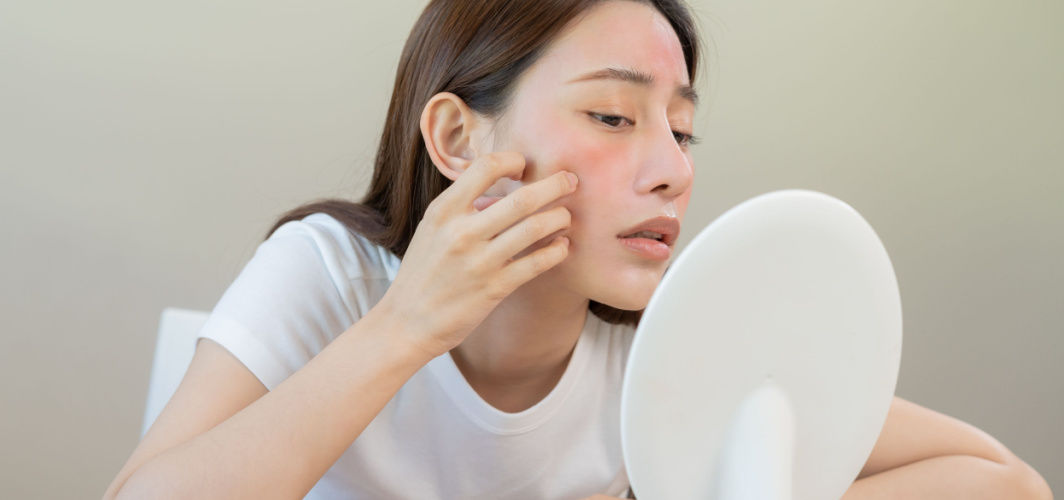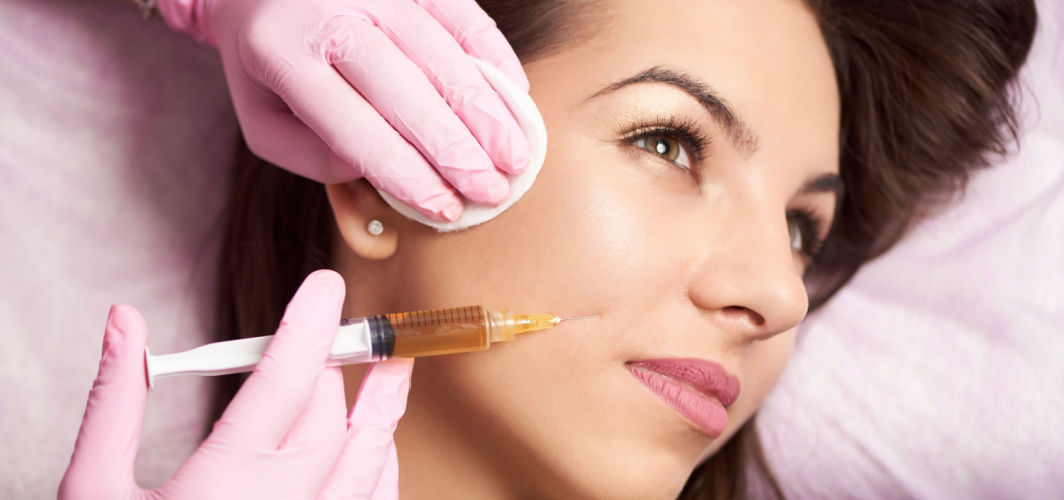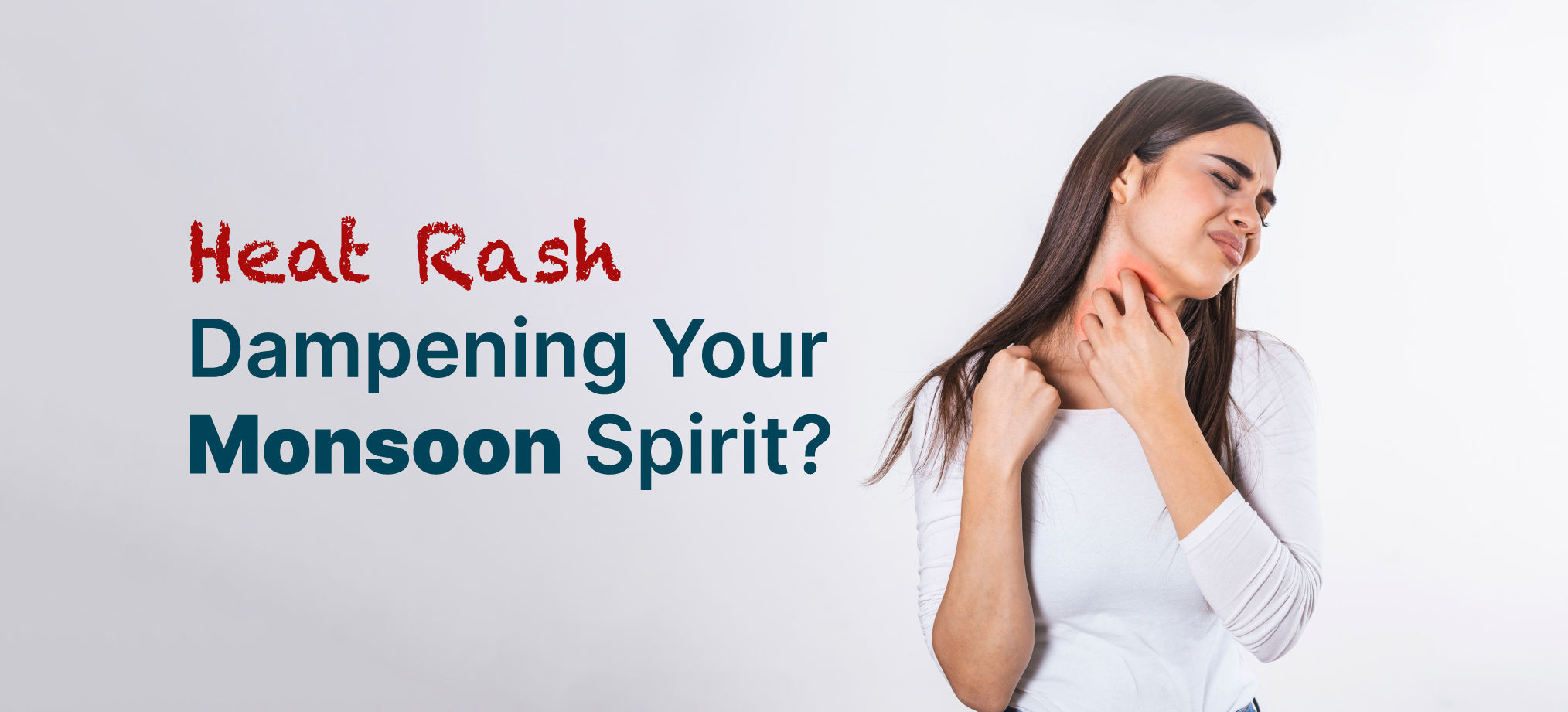Skin Care
Rosacea Acne: Definition, Causes, Triggers, Symptoms, Treatments & Prevention
6 min read
By Apollo 24|7, Published on - 12 October 2023
Share this article
0
0 like

Rosacea acne is a chronic skin condition affecting millions globally, including a significant number of people in India. It is characterised by redness, flushing, and sometimes small pimples or bumps on the face. In this blog, we will explore the underlying causes of rosacea, potential rosacea triggers, the array of symptoms it manifests, available rosacea treatments, and effective prevention strategies.
Causes of Rosacea Acne
Some of the most common causes of rosacea acne include:
1. Genetic Factors
Studies have shown that if you have a family history of rosacea acne, you may be at higher risk of developing the same.
2. Environmental Triggers
Here are the most common environmental triggers for rosacea acne:
- Sun Exposure: Prolonged exposure to the sun's harsh rays can exacerbate rosacea acne symptoms. It is important to protect your skin by wearing sunscreen and seeking shade when necessary.
- Spicy Foods: Spices like chilli peppers, black pepper, and cayenne can cause blood vessels to dilate and trigger flushing in individuals with rosacea. It is advisable to reduce the spice quotient in your foods.
- Hot Beverages: Tea, coffee, and other hot beverages can increase body temperature and lead to facial redness and flushing. It is advisable to reduce the intake of these beverages to prevent symptom flare-ups.
- Dairy Products: Some dairy products like cheese and yoghurt contain high levels of histamine, which can trigger inflammation and worsen rosacea symptoms. You may consult your doctor before consuming them.
- Alcohol Consumption: Alcohol is known to dilate blood vessels, resulting in increased redness and flushing in individuals with rosacea acne. Limiting your alcohol intake or avoiding it altogether may help manage your symptoms.
- Stress and Emotional Factors: Stress and anxiety can trigger rosacea acne flare-ups. Finding healthy coping mechanisms and practising relaxation techniques can help reduce symptom severity.
Symptoms of Rosacea Acne
Understanding the symptoms of rosacea acne is essential for early detection and effective management. Here are some of the most common symptoms of Rosacea Acne:
1. Facial Redness and Flushing
- The most common symptom of rosacea acne is persistent redness on the central part of the face.
- This redness can worsen with triggers like heat, sunlight, spicy foods, and alcohol.
- Flushing episodes may occur, causing the face to feel warm or hot.
2. Papules and Pustules
- Small red bumps (papules) and pus-filled pimples (pustules) may appear on the affected areas.
- These lesions can be mistaken for acne but are different.
3. Visible Blood Vessels (Telangiectasia)
- Dilated blood vessels near the surface of the skin can give a spider-like appearance.
4. Eye Irritation and Dryness
- Some individuals with rosacea acne experience eye-related symptoms like dryness, grittiness, burning sensation, and sensitivity to light.
- These symptoms are collectively known as ocular rosacea.
Diagnosis of Rosacea Acne
A dermatologist will conduct a thorough examination of your skin, including your face, to observe any visible signs of rosacea acne. Since there is no specific test to diagnose rosacea acne, the doctors will assess the severity of the condition, take a complete medical history, and check for characteristic symptoms to confirm the diagnosis.
Treatment of Rosacea Acne
It's important to consult with a dermatologist or healthcare professional to determine the best course of action for your specific case. Here are some common rosacea treatment options:
1. Topical Medications
Medications that can applied directly onto the skin to reduce the symptoms of rosacea include:
- Metronidazole Cream or Gel: This medication is often prescribed to reduce inflammation and redness associated with rosacea acne. It can also help to control bumps and pimples. Apply it once or twice daily as directed.
- Azelaic Acid Cream or Gel: Azelaic acid works by reducing inflammation and killing bacteria on the skin's surface. It can help to minimise redness and prevent new breakouts. Use it as directed by your healthcare provider.
- Brimonidine Gel for Redness Reduction: This gel is specifically formulated to target facial redness caused by rosacea acne. It works by constricting blood vessels in the skin, resulting in a reduction of redness. Apply it only to the affected areas as instructed.
2. Oral Medications
Here are some oral medication options for treating rosacea acne:
- Antibiotics: Antibiotics such as Tetracycline and Doxycycline are commonly prescribed to treat rosacea acne. These medications work by reducing inflammation and controlling bacteria on the skin.
- Isotretinoin: Isotretinoin is a powerful medication used in severe cases of rosacea. It helps to reduce oil production and inflammation, resulting in improved symptoms. However, it should be used with caution due to potential long-term side effects.
- Anti-inflammatory medications: Corticosteroids are anti-inflammatory medications that can be prescribed in oral form for short-term use. They may help to relieve redness and inflammation associated with rosacea acne.
3. Laser and Light Therapies for Blood Vessel Reduction
Laser and light therapies are effective options for reducing blood vessels on the skin, which can help to improve the appearance of rosacea acne. These treatments include:
- Intense Pulsed Light (IPL) therapy: It uses light energy to target and destroy blood vessels without damaging the surrounding skin. This treatment is safe, non-invasive, and requires minimal downtime.
- Pulsed Dye Laser (PDL) therapy: This is another option that targets blood vessels, reducing redness and flushing associated with rosacea acne.
Lifestyle & Skincare Tips for Managing Rosacea Acne
Tips to manage rosacea acne at home include:
1. Gentle Cleansing and Moisturising Routine
- Use a mild, non-abrasive cleanser to gently wash your face twice a day.
- Avoid scrubbing or using rough washcloths, as this can aggravate your skin.
- Pat your face dry with a soft towel instead of rubbing it.
- Apply a gentle moisturiser suitable for sensitive skin to keep your skin hydrated.
2. Sun Protection Measures
- Protect your skin from the harmful effects of the sun by wearing a wide-brimmed hat and using sunscreen with a minimum of 30 SPF, especially during peak hours.
- Look for sunscreens that are non-comedogenic and specifically formulated for sensitive skin.
- Reapply sunscreen every two hours when outdoors.
3. Avoiding Triggers and Irritants
- Identify and avoid triggers that worsen your rosacea symptoms, such as spicy foods, hot beverages, alcohol, and extreme temperatures.
- Be mindful of skincare products that contain harsh ingredients like alcohol, fragrances, or menthol.
- Consider keeping a diary to track which triggers affect your skin the most.
4. Stress Management Techniques
- Practice stress-reduction techniques like deep breathing exercises, meditation, or yoga.
- Engage in activities that you enjoy and help you relax, such as listening to calming music or taking walks in nature.
- Get enough sleep and prioritise self-care to reduce stress levels.
5. Maintaining a Healthy Diet and Lifestyle
- Incorporate a healthy diet rich in fruits, vegetables, whole grains, and lean proteins.
- Avoid processed foods high in sugar and saturated fats.
- Stay hydrated by drinking plenty of water throughout the day.
- Exercise for at least 30 minutes every day to improve blood circulation and reduce stress.
Conclusion
Rosacea acne is a chronic skin condition that affects millions of people worldwide. It is characterised by redness, flushing, and the presence of small, pus-filled bumps on the face. Although the exact cause of rosacea acne is unknown, several factors are believed to contribute to its development. Seeking professional guidance is crucial in managing rosacea acne effectively. Dermatologists and healthcare providers can accurately diagnose the condition and provide tailored rosacea treatment plans based on individual needs.
Skin Care
Consult Top Dermatologists
View AllFrequently Asked Questions
Can I wear makeup if I have rosacea acne?
Can I wear makeup if I have rosacea acne?
What are the treatments and prevention strategies for rosacea acne?
What are the treatments and prevention strategies for rosacea acne?
What triggers rosacea acne?
What triggers rosacea acne?
Can rosacea acne be prevented?
Can rosacea acne be prevented?
Can rosacea acne be cured?
Can rosacea acne be cured?
Leave Comment
Recommended for you

Skin Care
Are Dermal Fillers Safe To Use?
This comprehensive guide examines the safety and efficacy of dermal fillers for a youthful look. It discusses different types of fillers, their benefits and risks, the importance of professional administration, and tips for minimizing adverse reactions.

Skin Care
How To Take Care Of Your Skin Before And After Holi?
Holi is a vibrant festival of colours, however, some of the toxic Holi colours can result in skin irritation and infections. Therefore, it is necessary to take care of your skin before and after the festival to avoid any skin issues.

Skin Care
Don’t Let Heat Rash Dampen Your Monsoon Spirit!
Hot and humid weather conditions bring along with the risk of heat rash. The article suggests proven measures to help you avoid heat rash.
Subscribe
Sign up for our free Health Library Daily Newsletter
Get doctor-approved health tips, news, and more.
Recommended for you

Skin Care
Are Dermal Fillers Safe To Use?
This comprehensive guide examines the safety and efficacy of dermal fillers for a youthful look. It discusses different types of fillers, their benefits and risks, the importance of professional administration, and tips for minimizing adverse reactions.

Skin Care
How To Take Care Of Your Skin Before And After Holi?
Holi is a vibrant festival of colours, however, some of the toxic Holi colours can result in skin irritation and infections. Therefore, it is necessary to take care of your skin before and after the festival to avoid any skin issues.

Skin Care
Don’t Let Heat Rash Dampen Your Monsoon Spirit!
Hot and humid weather conditions bring along with the risk of heat rash. The article suggests proven measures to help you avoid heat rash.
